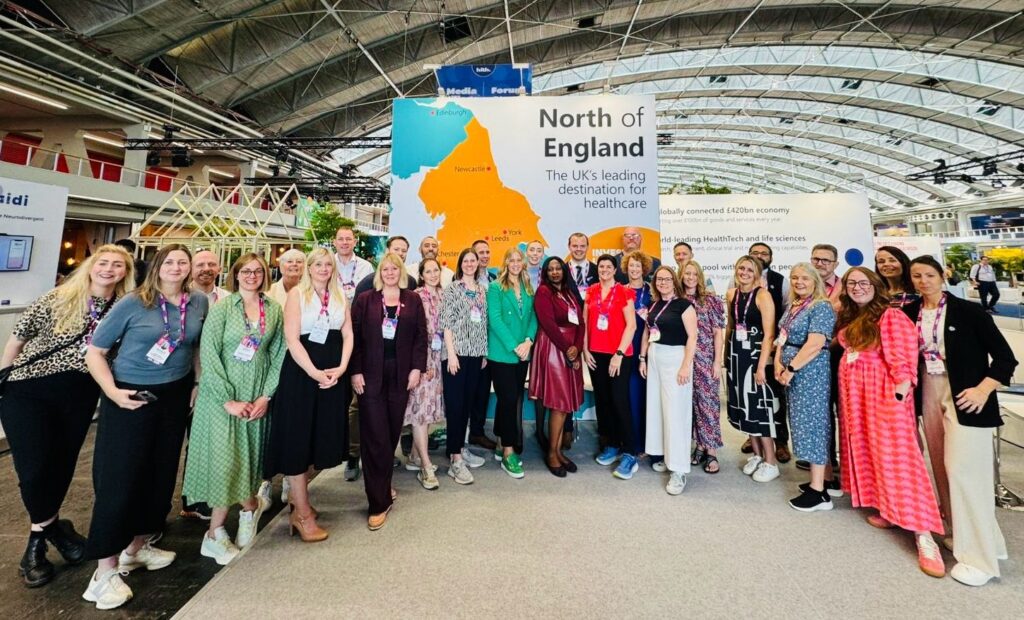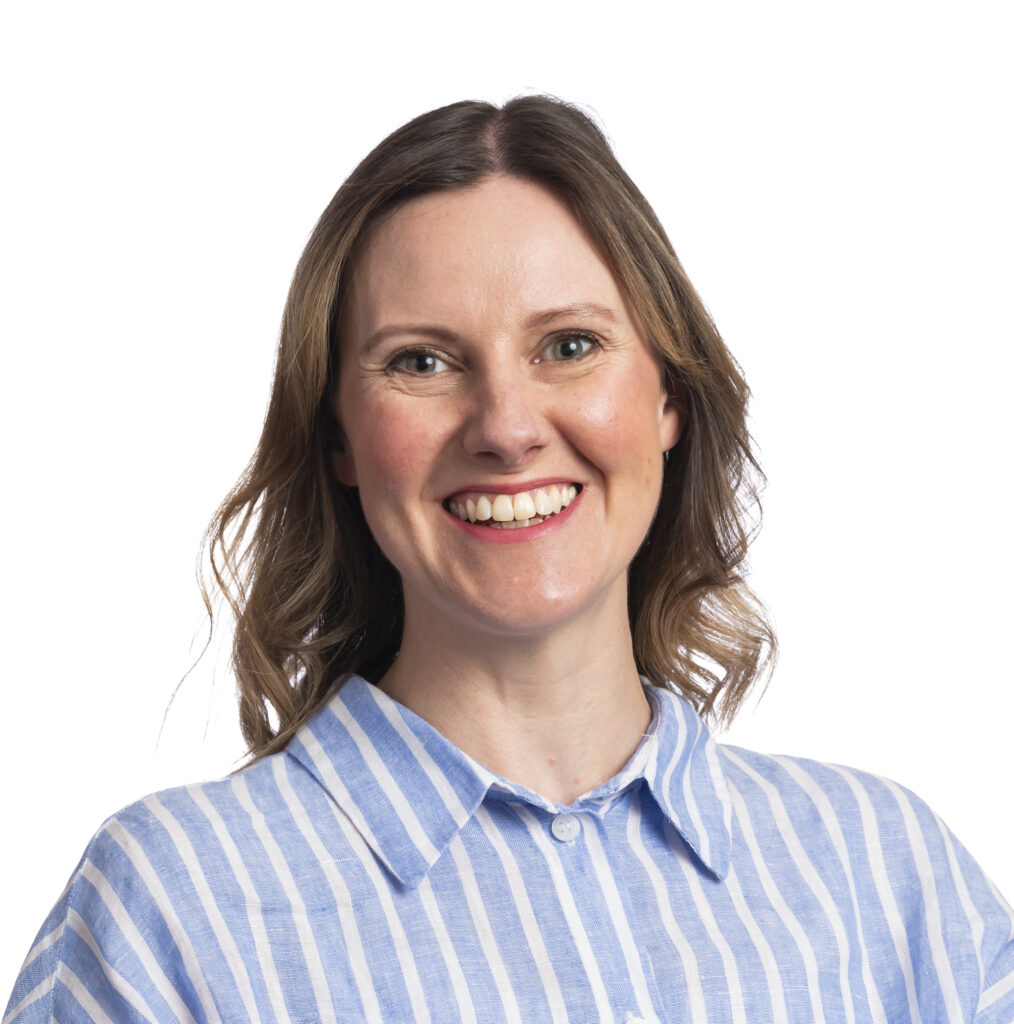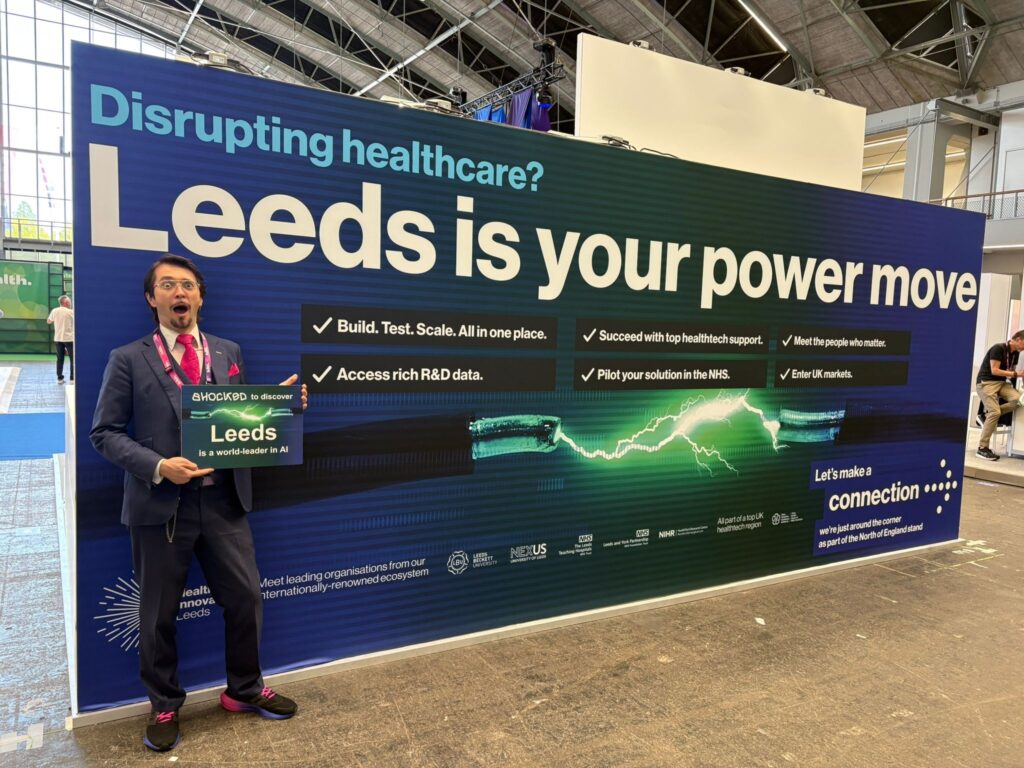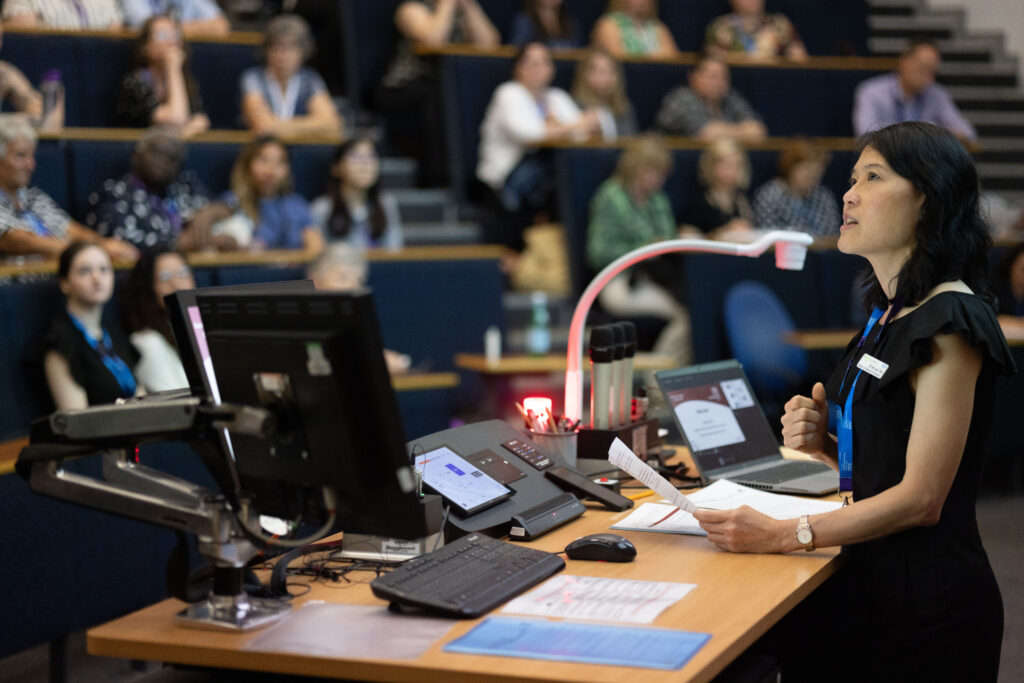It’s always invigorating to attend a game-changing health innovation conference – and this summer, I’ve had the privilege of attending two in the space of a month: one in Amsterdam, and one here at home in Leeds.
While the scale of our city showcase may undoubtedly have been different to the increasingly astronomical HLTH Europe, I was struck by the powerful similarities in the quality and impact of the work on show across both events, as well as the size of our ambition as a city – and as a global community – when it comes to tackling the hard stuff together.
Global communities, local connections
At HLTH Europe 2025, over 5,000 delegates from around the world gathered to spark ideas, power partnerships, and shape the future of healthcare.
The event has become well-known for bringing the right people together for conversations which are thoughtfully curated and seamlessly delivered.
And rightly so.
This isn’t about exchanging business cards – it’s about building meaningful, future-facing relationships across continents and sectors. Because the most complex challenges can’t be solved in isolation: for innovation to flourish we need trust, shared purpose and diverse perspectives.
For Leeds, HLTH Europe offered an exciting opportunity to showcase the strength of our uniquely connected health innovation ecosystem. Here collaboration is both deep – with mature partnership working embedded across the city – and wide, with regional and Northern colleagues coming together as a powerful collective at the event.
We were inspired to hear from global innovators building a better healthcare future, and in turn share the electrifying work happening in Leeds – particularly what opportunities are on offer to spark and support success.
This includes Nexus, a £40m innovation community, and the Leeds Teaching Hospitals NHS Trust Innovation Pop Up. Both dedicated to helping innovators get where they need to be – whether it’s linking entrepreneurs with leading academics, clinicians, and communities, to supporting access to world-class research expertise.
And the city is now gearing up to offer more tailored support to help businesses turn ideas into impact. We spoke to many innovators keen to hear more about the Old Medical School – a new healthtech innovation hub as part of Leeds’ Innovation Village. This brings together the amazing expertise of partners across the city, offering a unique opportunity for businesses to supercharge their growth through the support of an exclusive, bespoke service as part of their tenancy.
There’s no doubt that radical collaboration is achieving real results in Leeds. And at the Trust’s Research & Innovation Conference this July, we heard this approach is only set to strengthen.
Dr Ai Lyn Tan, Medical Director at the Trust, opened the event with a powerful vision for the future – outlining a bold five-year strategy that is “inclusive, collaborative, and with real world impact.”
The plans have five key focus areas: digital, data and AI, health inequalities, devices and diagnostics, novel therapeutics and patient outcomes research – all with patients at the very heart.
As one of the country’s biggest teaching hospitals, throughout the day we heard how the Trust is working with academia, business and community partners to accelerate advances in these areas – delivering tomorrow’s healthcare today.
Smart tech, human touch: from amazing advances in Amsterdam to world-leading work in Leeds
The LTHT R&I Conference confirmed we’re streets ahead in scaling AI safely – without forgetting the human touch.
LTHT’s Dr Beverley Riley and Nish Afsar from Newton’s Tree shared results from a recent study between the healthtech start-up and the Trust. This revealed a real-world risk of automation bias when AI tools go unchecked, and how the Trust is using these insights to leverage the transformative potential of AI responsibly and with the right oversight.
Caroline Gill, Senior Physiotherapist at the Trust shared the impressive results of a study into the effects of augmented reality (AR) games to support people with Parkinson’s Disease.
The team behind the software, Strolll, explained how people with Parkinson’s and their families have been integral to the development of the product, and this involvement has continued to grow.
Professor Rory J O’Connor, Head of the Academic Department of Rehabilitation Medicine at the University of Leeds shared that the project is now on its third research grant, where patients are co-applicants – involved at every step.
And at HLTH Europe, the use of data, AI and healthtech were – unsurprisingly – front-page topics.
We heard how the EHDS, launched earlier this year, aims to optimise healthcare data across (EU) borders to improve healthcare, foster innovation and support evidence based policy-making.
While this legislation won’t impact the UK, we’ve seen key investment in this space with the just-landed UK Industrial Strategy, including £600 million for a Health Data Research Service to create the world’s most advanced, secure and AI ready health data platform, and the introduction of the £100m National Data Library.
In Leeds, we’re shaping future healthcare by partnering in data and digital tech. The Leeds Data Model, considered a national exemplar, unites the city’s health and care services to enable real-world insights.
We were particularly proud to see the city’s world-leading work take centre stage in Amsterdam, with a number of Leeds speakers across the four-day event. This included a session from LTHT CDIO, Paul Jones, who wowed audiences with the Trust’s amazing advances using AI and associated technologies. Attendees heard how these approaches are enabling the Trust to support gold standards in breast screening, visualise anatomy, revolutionise radiology – and to truly change lives for people locally and globally.
And we were able to shock many visitors to our exhibitor stand with some lesser-known facts about the UK’s third largest city – including that Leeds is a world-leader in AI, and rank third internationally as a healthtech hub!
The final frontier: from science fiction to clinical reality
Across HLTH Europe and the LTHT R&I Conference we heard how science fiction is fast-becoming reality, with truly out-of-this-world solutions to the planet’s current and future health needs.
Maybritt Kuypers, Senior Flight Surgeon at the European Space Agency, explained how the next frontier of healthcare will involve solutions developed in zero gravity, with the International Space Station acts as an orbiting lab. This offers a unique testbed to better understand the human body – both in orbit and on Earth.
Maybritt explained how proteins grow faster, better and larger in microgravity, making it easier for teams to analyse and develop drugs, and to grow human tissue.
And back on terra firma, we heard about similarly cutting-edge developments at the LTHT R&I Conference.
Professor Chris Twelves and Dr Prashant Kathuria explained that Leeds has now become one of a small number of UK trial sites for personalised cancer vaccines – world-first treatments tailored to the unique genetic makeup of a person’s tumour, building on the mRNA platforms used in COVID-19 vaccines.
In an awe-inspiring session on the Cancer Vaccine Launchpad, audiences heard how Leeds is bringing these globally-leading trials closer to home for local communities.
Chris highlighted that Leeds’ unique NIHR infrastructure powers innovative trials such as these, with one Clinical Research Facility (CRF) operating across five integrated sites within the Leeds Teaching Hospitals NHS Trust.
NHS centre stage in Europe and at home
At HLTH Europe, main stage speaker Dr Penny Dash, Chair of NHS England, offered an unflinching yet hopeful assessment of the NHS: a globally-respected 77-year-old institution built on powerful principles, but under unprecedented strain.
Speaking with The Sunday Times’ Health Editor Shaun Lintern, Penny celebrated what sets the NHS apart: care that’s free at the point of need, leadership in genomics, and a deeply embedded culture of population health and evidence-based care.
But, as outlined in the Darzi Report, there are big challenges. More than 55% of the UK health budget is currently spent on hospital services, the NHS has struggled to harness tech at scale and in some areas has experienced a loss of financial discipline.
The recently announced 10 Year Health Plan points to three shifts to address these challenges:
- Treatment to prevention
- Hospital to community
- Analogue to digital
Penny’s message was not just about infrastructure, but about mindset. To truly transform the NHS, we need to embrace innovation across every level – and be bold in asking the hard questions about adoption, equity and outcomes. We must learn from what works globally: France’s strength in digital health, the Nordics’ exemplary primary care, Germany’s use of data for planning and performance.
Leeds is proud to be leading the charge when it comes to already delivering against these ambitions – from world-renowned work from Leeds Beckett University’s Obesity Institute, to city’s award-winnning HomeFirst programme.
Supporting the shifts from hospital to community, and analogue to digital, HomeFirst is leveraging data, digital tools and joined-up working to revolutionise care. Using an app to support real-time clinical updates and an interactive shared care record which staff can read and update, this novel approach sees timely decision-making by multidisciplinary health and care teams across the city, and better outcomes for patients who can return from hospital sooner – or avoid admission altogether.
At the LTHT R&I Conference, I was pleased to give the closing remarks for the day, celebrating how the Trust and the city are being recognised as nationally-leading by the Government.
LTHT’s advanced use of personalised medicine – harnessing genomics, AI and data – is highlighted by the 10 Year Plan for Health as an example of ‘the very best care’.
When it comes to the shift from treatment to prevention, we know that clinical care accounts for 20% of health outcomes while wider determinants make up 50 – 80%.
The Government’s plan recognises our city-wide work focusing on the social determinants of health, pointing to the ways Leeds is better connecting work, health and skills through the Leeds Anchor Network and our pioneering Leeds Health and Care Academy.
Good work is good for health, and these city initiatives – as well as our commitments as a Marmot City – support inclusive access to careers and offer an innovative pipeline of health and care talent – boosting population health and economic growth.
Signalling confidence in the city’s ability and track record in transforming care, the Government has also chosen the UK’s third largest city to drive forward its flagship health mission as part of a new national pilot programme designed to transform public services and shape future policy.
This means more of the groundbreaking solutions developed in Leeds will not only benefit and be shaped by local people, but will extend further – revolutionising care nationally and globally.
The news follows a recent visit from the Secretary of Health and Social Care, Wes Streeting, who this June met with a partnership of the city’s leaders and hailed Leeds “a healthcare innovation powerhouse”.
Can we tackle the hard stuff and keep the sparkle?
When planning HLTH Europe 2025, the organisers asked themselves: would they be able to tackle the hard stuff and keep the sparkle?!
This question answered itself across the scintillating four-day conference – the continent’s biggest (and surely sparkliest).
We took a stark look at the issues facing the UK’s health service, discussed how, for many children, life is no playground – with rising rates of poverty, obesity and mental ill health and we heard how tech and AI isn’t always the magic bullet we want it to be when it comes to solving some of the hardest global health problems.
HLTH Europe didn’t shy away from the scale of the challenge, and what we must do to shape a healthier, better future – but crucially, it brought the right people together to catalyse real change. And while it was wrapped in the iconic HLTH Europe sparkle, the passion and energy from the thousands of attendees outshone any glitter.
We were so proud that Leeds and the region was part of it. A city where world-leading work is rooted in reality: Leeds has the glitter and we’ve got the grit.
Like most major UK cities, we have a high proportion of people living in some of the most deprived areas nationally, with significantly worse health outcomes and shorter average life expectancies. In the city’s most deprived communities, women live, on average, nine years less than those in the least deprived areas – rising to 10 years less for men.
At the LTHT R&I Conference Tony Young, NHS England’s National Clinical Lead for Innovation, put it perfectly: the challenges we face globally are like the Gordian Knot – complex, entrenched, and seemingly unsolvable. But, as he reminded us, “impossible is just a state of mind – a barrier that stops you from taking the next step.”
At home and at HLTH Europe, we heard how we’re making the impossible possible.
In Leeds, we’re harnessing the power of huge datasets to improve people’s lives, tackle health inequalities, and reduce pressure on services. This includes building the world’s biggest cancer database: working with Flatiron Health UK, the Trust is translating patient records into high-quality data to expand cancer research.
And behind this dazzling work, the LTHT R&I Conference pointed clearly to the people and partnerships who make innovation possible in Leeds and beyond. As Ai Lyn put it, “together, we all represent the rich tapestry of talent, curiosity and compassion that fuels innovation and drives progress.”
I was proud to represent Leeds Academic Health Partnership – one of the biggest of its kind in the UK. The scale and maturity of this collaboration really does show that we’re doing something special in Leeds – we’re bringing our communities together with clinical services, research, academia, local government and our fantastic third sector to tackle some of the hardest health challenges.
And both events reminded us that to solve these challenges, and slice through the impossible knot, we need boldness, bravery …and, of course, a little sparkle.
Stay up to date with more of the latest news and updates from Leeds’ internationally-renowned health innovation ecosystem by signing up to receive our ebulletin. Find our quick-to-complete subscribe form below ⬇️




